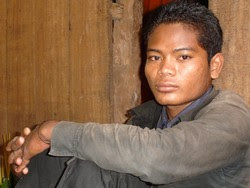 Lured by the prospects of better job opportunities, many men have fallen victim to human traffickers as well (Photo: David Swanson/IRIN)
Lured by the prospects of better job opportunities, many men have fallen victim to human traffickers as well (Photo: David Swanson/IRIN)"Trafficking is a mega-problem in Cambodia. It's becoming a critical issue that needs to be tackled head-on, in a coordinated and comprehensive way."PHNOM PENH, 17 September 2008 (IRIN) - Trafficking in Cambodia is set to rise with the sharp increase in food and fuel prices, according to humanitarian workers.
"The lure of a better life and a secure income is bound to trap more unsuspecting youngsters into the grip of these trafficking rings," Lim Tith, project coordinator for the UN Inter-Agency Project on Human Trafficking (UNIAP) in Cambodia, told IRIN.
"Trafficking is a mega-problem in Cambodia," said Vicheth Tuon, chief executive officer of the NGO Coalition to Address Trafficking and (Sexual) Exploitation of Children in Cambodia (COSECAM).
"It's becoming a critical issue that needs to be tackled head-on, in a coordinated and comprehensive way," he said.
According to the UN, men, women and children are susceptible to trafficking, with some trafficked inside the country and others sent abroad - mostly for labour exploitation.
Some women and children are recruited from the countryside by gangs and inducted into the sex trade in Phnom Penh, Siem Reap and Sihanoukville, while most end up in domestic service, factories, ships or as beggars.
"I came to Phnom Penh to work in a restaurant," a 22-year-old bar-girl, Pong Ly Kaeng, said. "The owner came to our village in Svay Raeng and promised my sister he would look after me and pay me a good salary. So I went with him. But I left when the owner tried to make me have sex with a customer. Then my cousin found me a job in the bar. But I don't sleep with all my customers."
Such stories are typical among the girls working in the capital's entertainment industry, in "hostess" bars, Karaoke clubs, beer gardens and brothels.
"At least 20 percent of sex workers in Phnom Penh have been trafficked," said Lim. "It is difficult to estimate the number of people being trafficked into Phnom Penh to be commercial sex workers, but it is a constant stream, probably between 200 and 500 a month," he said.
Trafficking abroad
But there have also been reports of women being trafficked abroad for sexual exploitation.
"A few years ago there was a major case of Cambodian women being smuggled into Somalia," said Lim. "There have also been a few cases of women being transported to Kuwait and Saudi Arabia to become commercial sex workers. Of course there are also many Vietnamese women who have been trafficked from southern Vietnam to work in Phnom Penh's sex industry," he said.
Many of them are under-age, a Cambodian aid worker who monitors the situation, told IRIN.
Another disturbing trend is children being trafficked to neighbouring Thailand and Vietnam to work as street sellers or beggars.
Most of the girls selling flowers in Bangkok's red light districts are Cambodians - including seven-year-old Kimmi from Phnom Penh, who has been selling roses in Nana for more than two years after her father sold her to a trafficker for US$50.
Cambodian children, especially from the western provinces, are being trafficked to Vietnam to beg and to a lesser extent work as scavengers in the southern city of Ho Chi Minh.
"Handicapped children are particularly vulnerable, as they are believed to be more effective beggars," said Lim, adding that up to 700 children a month were being trafficked across the border.
Cheap labour
Yet most Cambodians who are trafficked end up in sweat shops, construction sites, fishing trawlers and domestic service, mainly in Malaysia, Thailand and Taiwan.
"One of our current concerns is Cambodian men who are being trafficked to work on fishing boats in Malaysia and Thailand," Lim said.
More than 4,000 a year were being trafficked, passing through a network, from one local recruiter to another in Phnom Penh or the border town of Poipet, to a Thai gang and then sold on to a boat, he said.
Conditions on many of the boats, which go out to sea for up to six months, are reportedly intolerable, with few safety precautions taken.
"Once on the fishing boat, life is unbearable; we get little to eat and are often beaten," Kong, a former Cambodian fisherman on a boat based in southern Thailand, said. "It's so bad there are only two choices: commit suicide or jump ship," he said.
According to the UN, more than 200,000 trafficked Cambodians are working in factories and boats in Malaysia and Thailand.
"The situation remains critical, and the fact that it remains hidden makes it much harder for the government and development workers," Tuon said.

























1 comment:
Of course, it remains hidden because all human trafficking
operated by wealthy businessman and connection with
government (CPP).
Post a Comment